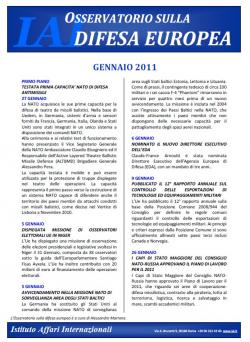Observatory on European defence, March 2003

March 2003
Europe - Iraq
20 March marked the beginning of the Anglo-American military operations against Iraq, which carried on through the end of the month.
On 6 March NATO drew up, following long negotiations which saw strong divisions among member countries, some measures towards the defence of Turkey. On 22 March the Secretary General was urged to press Turkey for not intervening directly in the conflict.
On 7 March the United Kingdom and the United States proposed a resolution substantially authorizing the use of force, lately withdrawn, that clashed with the French, Russian, and German opposition.
The conflict was the object of several heated discussions at the bilateral and European level, in particular the Council of 21-22 March; on 26 March the European Parliament attempted in vain to reach a position on the conflict, but it was not in the position to approve any resolution.
The concluding phase of the diplomatic clash at the United Nations and the decision of the United States and the United Kingdom to intervene militarily revealed a substantial division among European countries supporting or opposing the intervention.
11 March 2003
European Commission - Defence Industry
The European Commission (EC) presented to the European Parliament a report on the defence industry entitled “Towards an EU Defence Equipment Policy”. It is the Commission’s third Communication on this subject (the two previous ones date back to 1996 and 1997). The previous communications were not followed by practical endorsement by national governments.
The Commission’s proposed recommendations for the purpose of making the process of restructuring the defence industry in Europe compatible with the Union’s political objectives (and those of the ESDP in particular) are as follows:
- involvement of the EC in the monitoring of the industry and in the standardization process of the assets, as well as in the research for defence purposes;
- streamlining of procedures of the inter-European transfer of armaments;
- harmonization of market regulations (including the revision of Article 296 of the Treaty) and exports, for the purpose of guaranteeing efficiency and competition, with regard to common rules;
- development of a European Armaments Agency.
Moreover, the Commission will proceed toward a definition of a “Green Paper” on the subject, expected in 2004.
14 March 2003
EU-NATO - Agreement on Security of Information
The two institutions’ greatest authorities signed an agreement in Athens that guarantees the preservation of classified information exchanged between the two parties.
Reaching an agreement on the subject is considered an essential condition for the operationalisation of agreements between the EU and NATO on security issues (Berlin plus).
14-15 March 2003
Informal Defence Council - ESDP Capabilities and Missions
The informal meeting of the Union’s Defense Ministers, held in Athens under the guidance of the Greek Presidency, touched on various arguments, though attention was focused on the evolution of the crisis in Iraq and the different positions on the matter emerging among the member countries.
The Ministers discussed the reports presented by the working groups on 1 March on the Union’s military capacities (ECAP) and defined the procurement priorities (C4I, transport, air refuelling, and unmanned aircraft).
The proposal to institute a European Armaments Agency to support the work on capabilities has been examined.
Concerning the ESDP missions, the possibility to reduce the reaction times of the Union’s Reaction Force was discussed, as well as the possible first employment in Macedonia (FYROM) as a replacement for the NATO operation “Allied Harbour”.
21-22 March 2003
European Council - Iraq and Defence Initiatives
The deterioration of the Iraqi crisis has inevitably attracted the attention of the European Council.
After a series of rather turbulent meetings, the 15 adopted a joint release focused not on the divisions which still remain among the countries regarding the armed intervention, but rather on the developing prospects at the end of military operations.
In particular, they called for a strong role for the United Nations, a pledge of support for a humanitarian intervention and the development of a regional setting for the whole Middle East.
Beyond the debate on Iraq, the Council welcomed the Commission’s initiative on the defence industry on 11 March, placing particular emphasis on the evolving possibilities of a common research and development policy regarding this matter.
Belgium launched a proposal to organize a conference on European defence on 29 April, which has been agreed to by France, Germany, and Luxembourg. This proposal has had different receptions: the Commission and the Greek Presidency seem to support it, while Great Britain in particular, as well as Spain and Italy, appear less enthusiastic.
31 March 2003
ESDP Mission in Macedonia (FYROM) Begins
In a ceremony presided over by High Representative Solana, the transfer of authority took place between NATO’s “Allied Harmony” mission and “Concordia”, the new mission under EU direction, in Macedonia (FYROM).
It is the EU’s first military operation, rendered possible by the recent attainment of permanent agreements of cooperation between the Atlantic Alliance and the European Union.
The Concordia operation will last six months and include some 350 troops from 27 countries, under the field command of General Pierre Maral (France is the “framework nation”) and relying upon NATO support. The D-SACEUR, Admiral Rainer Feist (NATO, German) is the Operating Commander.
On 18 March the External Relations Council approved the decision to replace the Atlantic Alliance, after the NATO Council had decided to put an end to its own operation on 17 March.
The costs charged to the common budget are expected to total 4.7 million Euro.
-
Details
Roma, Istituto affari internazionali, 2003 -
Issue
03/03


